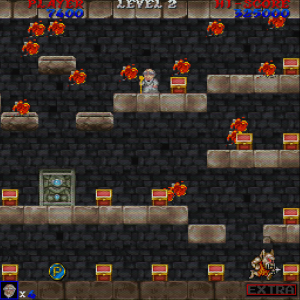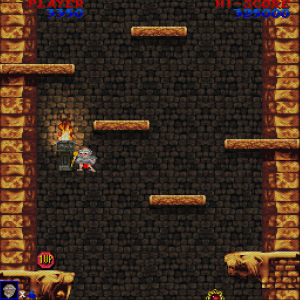Eternum is a platformer made in the much-underutilized Arcade Game Studio engine with a large focus on getting a high score and, as its engine’s name suggests, a level of difficulty which would make it feel right at home in an arcade. There are quite a few nods to the Ghosts ‘n Goblins series (and what look to be quite a few sprite rips from Castlevania games for that matter), the main character is even explicitly stated to be Arthur as an old man searching for a way to regain his youth, but Eternum’s gameplay is largely unique despite its aesthetics.
This isn’t a particularly long game with only 25 short stages, but it doesn’t need to be lengthy. Most of the stages are about 3 screens wide and start Arthur near the ‘portal’ in the center. The goal in each of these stages is simple – there are dozens of treasure chests scattered across the ground and various platformers and Arthur must collect them all to open the portal and run through it. A variety of enemies rapidly spawn in from just about everywhere and Arthur himself only has a standard jump (thankfully not the fixed jump from Ghosts ‘n Goblins) and a cane which he can swing for a short-range melee attack. Furthermore, Arthur dies in one hit from anything and treasure chests only give 50 points in a game where you need 75,000 points to get a 1-up. Thankfully, there are several useful elements here which help to combat the unforgiving difficulty.
 Like just about any good arcade game, powerups and finding ways to earn extra lives are just as important as getting a lot of points and all three elements are interconnected. While it is true that treasure chests are worth 50 points by default, Arthur can jump up to hit his head on the platform below a chest to partially open it, increasing its value to 200 points, and can do this a second time to fully open a chest and increase its value to 500 points. What’s more, a 500-point chest will always create golden sparkles after it is collected and these will in turn cause an item to rise from the ground at their location a second or two later. There are a decent number of potential items, including a ruby worth 1000 points, the letters of the word ‘EXTRA’ (which give a 1-up when fully collected), a ‘bomb’ which causes a large number of fireballs to bounce around and kill enemies for a few seconds, and even an eye which will float over Arthur’s head and automatically open chests near him, including chests on the ground which otherwise are not possible to open. Every normal stage also has a powerup on the ground in the center which will temporarily allow Arthur to shoot fireballs and become outright invincible for a few seconds. It’s a good balance of risk versus reward; taking the time to fully open chests and collect powerups can lead to a large number of both points and lives, but doing so means needing to survive for a longer amount of time against the onslaught of enemies and Arthur’s mobility becomes somewhat limited as powerups will disappear a few seconds after spawning. While there are thankfully infinite continues, using a continue will restart the current stage and, of course, reset your score while using a life will respawn Arthur right where he died, so taking risks to build up a good number of lives becomes increasingly important as the game progresses.
Like just about any good arcade game, powerups and finding ways to earn extra lives are just as important as getting a lot of points and all three elements are interconnected. While it is true that treasure chests are worth 50 points by default, Arthur can jump up to hit his head on the platform below a chest to partially open it, increasing its value to 200 points, and can do this a second time to fully open a chest and increase its value to 500 points. What’s more, a 500-point chest will always create golden sparkles after it is collected and these will in turn cause an item to rise from the ground at their location a second or two later. There are a decent number of potential items, including a ruby worth 1000 points, the letters of the word ‘EXTRA’ (which give a 1-up when fully collected), a ‘bomb’ which causes a large number of fireballs to bounce around and kill enemies for a few seconds, and even an eye which will float over Arthur’s head and automatically open chests near him, including chests on the ground which otherwise are not possible to open. Every normal stage also has a powerup on the ground in the center which will temporarily allow Arthur to shoot fireballs and become outright invincible for a few seconds. It’s a good balance of risk versus reward; taking the time to fully open chests and collect powerups can lead to a large number of both points and lives, but doing so means needing to survive for a longer amount of time against the onslaught of enemies and Arthur’s mobility becomes somewhat limited as powerups will disappear a few seconds after spawning. While there are thankfully infinite continues, using a continue will restart the current stage and, of course, reset your score while using a life will respawn Arthur right where he died, so taking risks to build up a good number of lives becomes increasingly important as the game progresses.
No other part of Eternum contains such a high degree of both risk and reward as its boss stages. Every fifth stage is a boss stage which, unlikely the other stages, is a vertical tower where the goal is to reach the top, fight a boss arbitrarily named after some sort of Lovecraftian abomination, and collect a magical golden orb. Enemies aren’t quite as abundant here as they are in other stages, but the verticality makes them much harder to fight and hazards are everywhere. Normal stages are far from easy, but boss stages are where you are likely to burn through more than a few lives and where stocking up on lives really pays off. There aren’t any chests in boss stages, but there are rubies and, most importantly, multiple 1-ups scattered throughout. The catch to these free lives and massive point boosts is that they will start to disappear the moment they appear on-screen so you’ll need to quickly do some tricky platforming to reach them in time and falling down or, as Arthur takes a few seconds to respawn, dying will usually result in these rewards disappearing mere moments before you can collect them. A green imp will also fly around in boss stages and touching it will grant invincibility and fireballs for a few seconds, but it usually does such a good job of staying out of reach amidst all the death traps that I found it to rarely be worth trying for.
 Bosses are far easier than their actual stages and, while appropriate for the arcade-style gameplay, feel underwhelming. Each boss is a picture of a demon in large block of bricks in the background. Arthur will usually need to make use of moving or falling platforms to get within attack range and in most cases there are spikes directly below the boss to prevent players from simply whacking it to death with Arthur’s cane while standing at its feet. Boss rooms themselves fill a single screen and enemies will spawn in to attack Arthur, but the boss itself does not harm Arthur on contact and otherwise only attacks by opening its left hand and periodically sending out an energy bullet, though even this attack stops completely once the boss’s block becomes cracked after a few hits.
Bosses are far easier than their actual stages and, while appropriate for the arcade-style gameplay, feel underwhelming. Each boss is a picture of a demon in large block of bricks in the background. Arthur will usually need to make use of moving or falling platforms to get within attack range and in most cases there are spikes directly below the boss to prevent players from simply whacking it to death with Arthur’s cane while standing at its feet. Boss rooms themselves fill a single screen and enemies will spawn in to attack Arthur, but the boss itself does not harm Arthur on contact and otherwise only attacks by opening its left hand and periodically sending out an energy bullet, though even this attack stops completely once the boss’s block becomes cracked after a few hits.
Disappointing boss fights aside, Eternum is likely to satisfy any nostalgia-fueled desires for the ‘good old days’ of arcade gaming with its fast, brutally intense platforming and its fine-tuned balance between risk and reward.